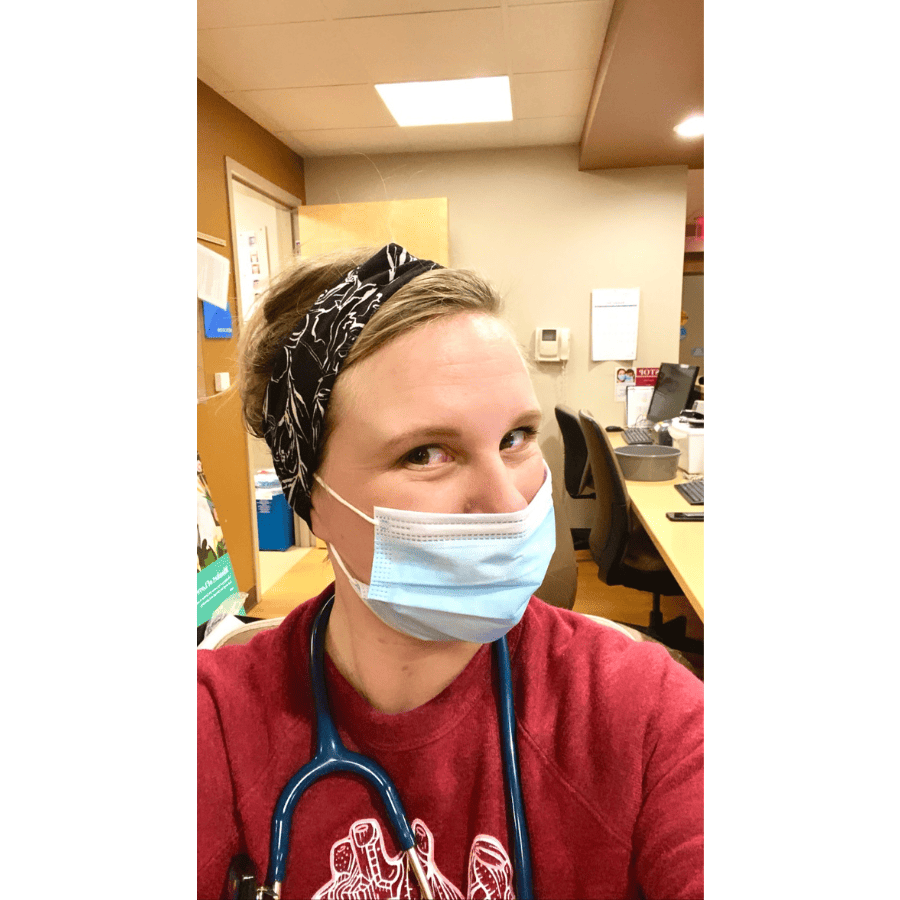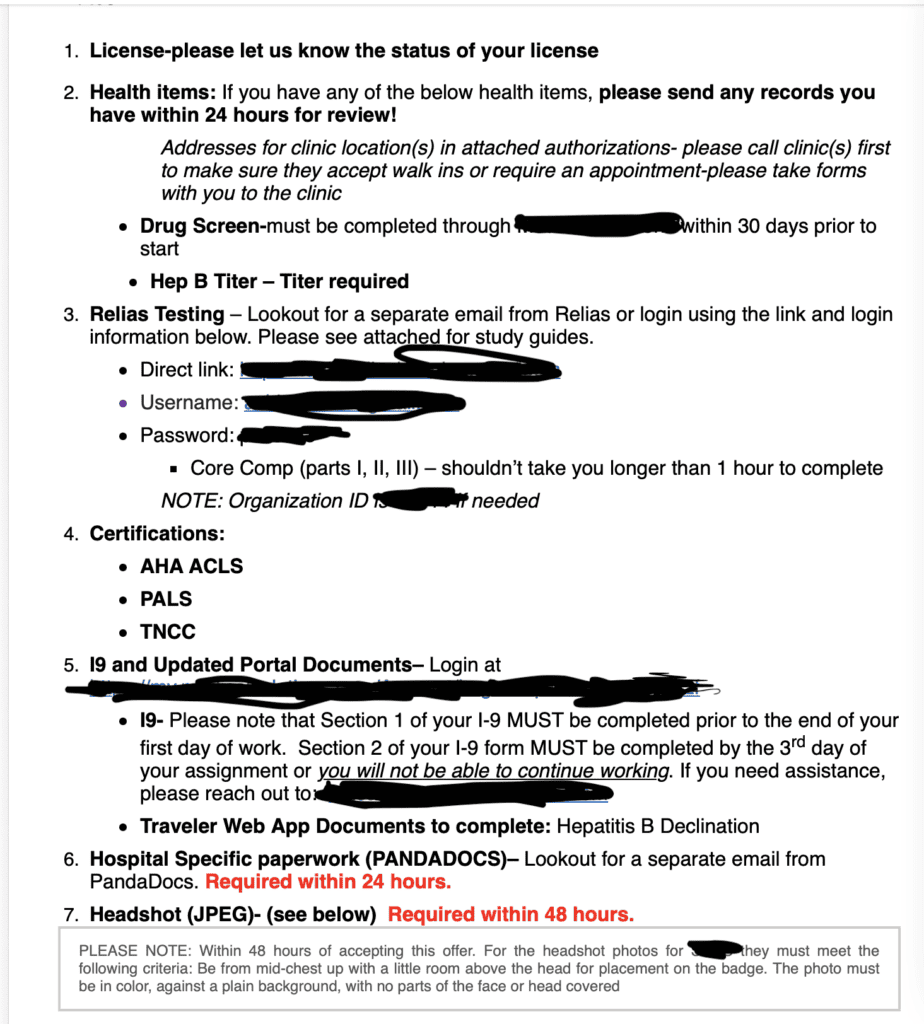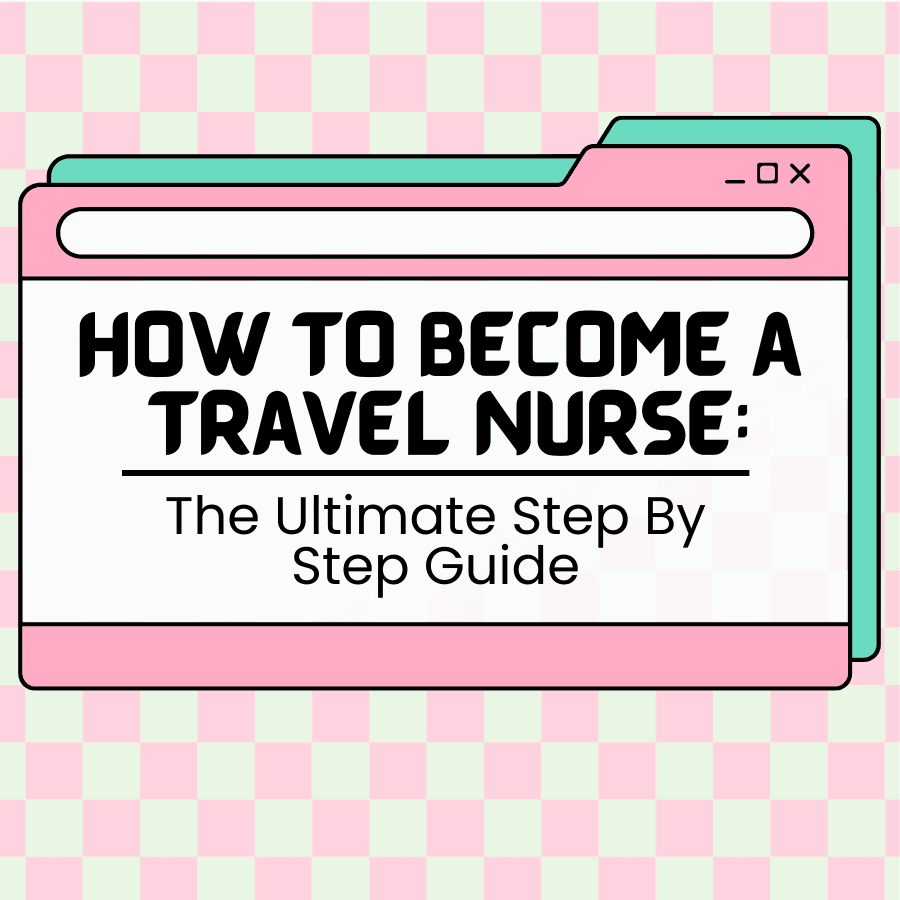I was packing my life into my car, getting ready to move for the third time this year, and instead of thinking about how hard and frustrating it is to be moving all the time, I had a different thought.
I love my life.
I love having the freedom to just pick up and go when I decide that I don’t want to work at my current facility anymore.
If you are wondering how to become a travel nurse, this article is for you.
My name is Ashly, and I have been a traveling nurse for three years now.
Here are the steps of how to become a travel nurse from start to finish.
10 Steps To Becoming A Travel Nurse
- Go to nursing school and get your Bachelor of Science degree in nursing
- Pass the NCLEX and become a Registered Nurse
- Choose a specialty
- Gain 1-2 years experience
- Apply for state nursing licenses
- Start looking for jobs
- Pick a travel nurse agency to work with
- Apply to jobs
- Complete the compliance requirements
- Start packing
The good part about becoming a travel nurse is that it is very fluid.
Maybe you are already an experienced RN and you want to start traveling.
Or maybe you are just starting to apply to nursing school but your end goal is to be a travel nurse.
Wherever you are in the journey doesn’t really matter — anyone who’s a nurse can become a travel nurse. We all follow the same travel nurse requirements.
The difficult part is taking action to get started. I will also admit that the first contract is the roughest.
But once you have all of your systems in place, the rest is a breeze.
What Is A Travel Nurse?
Before we start, you might be asking yourself, what do travel nurses do?
A travel nurse is a registered nurse who travels around the country to work at hospitals that are understaffed and who need experienced RNs to fill in until they hire more permanent staff.
Although exciting, life can be tough: you’re constantly away from friends and family, you don’t get to sleep in your own bed, you are living in someone else’s house, the area is unfamiliar, making friends can be tough, and life can be pretty lonely.
It also greatly depends on where you are at in life.
For example, I don’t have any kids (just two cats) and I don’t own a house, so travel nursing was a no-brainer for me. I love this life.
But, if you do own a house, you have to decide if someone will watch it while you’re away or if you want to rent it out.
Pro tip: Check out my article, “21 Travel Nurse Tips” for some of my best advice for new travel nurses.
How Long Does It Take to Become A Travel Nurse?
Becoming a travel nurse can take between 4 and 6 years: 2 years to earn an Associate’s degree in nursing, or 4 years for a Bachelor’s degree in nursing, plus 2 years of experience as a staff nurse.
If you already hold a degree in nursing and are an RN, then all you need is two years of experience working as a nurse (with at least 1 year in your specialty) to start traveling.
This timeline also applies to all 50 US states. All you need after this is to apply for an RN license in the state of your choosing.
With all of this in mind, let’s get into the steps of how to become a travel nurse!
How To Become A Travel Nurse In 10 Steps
Step 1: Go To Nursing School

Step one is getting accepted to an accredited nursing program.
You can either get an ADN (associate degree in nursing) from a community college, or you can get a BSN (bachelor of science in nursing) from a university.
An ADN is enough to start working as a staff nurse (and also much cheaper), but more and more jobs are requiring RNs to have their BSN.
If you want to be a competitive candidate for a career in travel nursing, already having your BSN is the way to go.
Not to mention, if you’re already going to hell, I mean nursing school, then you might as well get everything you can out of it.
Step 2: Pass The NCLEX
In order to become a board-certified registered nurse, you must pass the NCLEX.
I suggest taking it within 1-2 months after graduating nursing school. You will never again know as much as you know when you have just graduated. READ: Don’t put it off.
And if you’re looking for a good NCLEX study program, I suggest U-World. I used it and finished the exam in 75 questions which is the minimum number of questions you need to pass (i.e., I did very well).
Step 3: Choose A Specialty
This is a very personal and very important choice.
There is also a very good chance that you already have something in mind at this point.
But if you don’t, then do what a lot of new grads do and start in the medical-surgical unit. You get to see a little bit of everything and learn a lot of stuff about a lot of specialties.
If in the future you do want to switch, you will need to take a step back and get one year of experience in that department.
Pro tip: when applying for travel nursing jobs, they will ask how many total years of experience you have and also how many years in your specialty you have, so make sure you have at least one year’s worth in whatever unit you are applying for.
Step 4: Gain 1-2 Years Of Experience In Your Specialty

In general, you should have at least two years of experience in your specialty before you start travel nursing.
I had one year of experience, in total, but I was also very determined to be a travel nurse as quickly as possible.
Were my options limited? Absolutely. Could I have benefited from another year of experience before traveling? Absolutely. Do I regret it? Definitely not.
Remember, when you start a new contract you will probably only get one shift of training on the floor (sometimes less) before you are on your own, so you must be confident with your skills.
As a traveling nurse, you are expected to be confidently skilled and able to work independently right off the bat. The whole purpose of orientation at a new assignment is to learn where things are and the policies and procedures of your new facility.
I only harp on this because I have seen some really bad travel nurses in my day and that is not ok. Patient’s lives are literally in our hands and that must be taken seriously.
Step 5: Apply For State Nursing Licenses
This is when you need to start thinking about where you want to work.
Nurses must be licensed in the state that they want to work in.
If you live in a compact state, then you already have a compact license that allows you to work in 41 states (at the time of writing this article). If you are not originally licensed in a compact state, then I suggest you start applying to other states as soon as possible as some can take months to get approved.
The process of applying for state nursing licenses varies from state to state. However, there are some general steps you can take to ensure a smooth application process.
First, research the specific requirements for the state you want to apply to. Each state has its own licensing board and may require different documentation. At a minimum, you will need all college transcripts, a copy of your nursing diploma, and also to get fingerprints done (each state has different requirements for this part). Make sure you gather all the necessary information and documents before starting the application process. Trust me, it will make your life SO much easier.
Next, complete the application forms accurately and thoroughly. If you miss any box or fill anything out incorrectly, they will deny you. It is so important to pay attention to detail and provide all the required supporting documents.
Once you have submitted your application, be prepared for potential delays.
It took me almost four months to get my California RN license.
Be patient but stay diligent and follow up. If it has been an unusually long amount of time since you heard anything, send an email as you may have slipped through the cracks.
Step 6: Start Looking For Jobs
Once you have started the licensing process, then you can start looking for jobs in that area. Some states allow a temporary permit, but others don’t. Every state will want you to have something though — it’s not enough to say that I’ve applied and am waiting. They will not allow you to apply for the job.
The question often comes up, “Do I search for a travel nurse agency or a job first?”.
The whole point of travel nursing is that we get to work where we want — decide where you want to work first, search for jobs in that area, and then start reaching out to agencies.
There are a few websites that are my go-to to get a general feel of the market. When I first start my search, I prefer to use sites that are not agency-specific — I can pick a state and see jobs offered by multiple agencies.
| Website | Pros | Cons |
|---|---|---|
| Blue Pipes | There is no BS on this site. They don’t favor one agency over another, and they are generally very accurate to what the actual agency displays on their own website. | Sometimes shows jobs that were posted up to two months prior. |
| The Gypsy Nurse | This one is similar to Blue Pipes. Very organic and doesn’t favor any agency over another. | The organization and search tools aren’t as user-friendly as the other two sites. |
| Vivian Health | Vivian is a more aggressive travel nurse job search engine. The search tools are very well-organized and easy to use. | If you click on a job you like and select apply, not only will you hear from a recruiter, but you will continue to get texts, phone calls, and emails until you opt-out. |
I also recommend having a minimum amount that you are willing to work for. Not only is this good to help you narrow down the job list, but recruiters will ask you this.
I say aim high. Look at what the highest weekly rate is for that area, and then go from there.
Step 7: Pick A Travel Nurse Agency And Recruiter
The travel nurse staffing agency you land with will mostly be decided by the job(s) you like.
Most agencies out there are fine but there are a few that I stay away from.
I stick with the same two agencies, which are in my opinion, the best travel nursing agencies. I.E., I make excellent money with them.
Not only is it important to go with a good agency, but having an honest recruiter can make or break things for you.
When you first inquire about a job, you will likely talk to a recruiter, and that recruiter will be yours for the length that you’re with the company. I urge you to go with your gut and try to get a good sense of if they will have your best interests in mind. A lot of recruiters out there will try and skim money off the top of your pay so they can pocket it.
Pro tip: if they sound like a pushy salesman (talking fast, trying to get you to say yes without asking questions) then that’s probably what they are.
Here is a comprehensive list of travel nurse staffing agencies with reviews from real travel nurses. I wouldn’t swear by it, but use it as sort of a guide to help you decide if a company is trustworthy or not.
I have also compiled a small list of questions to ask your potential recruiter on that first phone call.
Remember, they are trying to land you as a client. You are the one interviewing them. Not the other way around.
- Can I see an example contract to see what your agency’s transparency is like?
- Do you offer relocation or travel reimbursements?
- If I call out sick, will there be a penalty fee that I will have to pay (this one is very important. You’d be surprised how many companies do this. And if they do, RUN).
- Do you currently have any assignments that you’d recommend for me, given my specific specialty and level of experience?
- Will you reimburse me for certification and licensing fees?
- Can I negotiate the rate?
- Are the hours guaranteed?
- What type of benefits do you offer travelers? Is medical insurance included?
- Do you offer completion bonuses?
- Do you offer retirement investment matching?
All of these questions, I ask every time I work with a new agency. Do not be scared to ask these. Your recruiter will actually respect you more if you do.
Step 8: Apply To Jobs
After you have found some potential contracts you like and have linked up with a good recruiter and agency, start applying for travel jobs!
This part is actually very easy as all you do is tell your recruiter if you like the job and they do the rest for you.
Be sure to also have an updated resume showing off your best nursing skills and tell them anything you would like your recruiter to highlight when they are submitting you to a job.
Step 9: Complete The Compliance Requirements
After you interview and get accepted to a job, now the real work starts.
Completing the compliance requirements for that first travel contract really is a pain in the ass, but I promise it gets much easier after this first one.
There are a bunch of general requirements that your agency has and then usually a few facility-specific things do get done. Your recruiter will connect you with a “compliance specialist” who will be your go-to person for helping you get everything completed in time.
Did I mention there is a time crunch? Yeah. It’s stressful.

This email was from my most recent contract and was about 2/3 of what I had to do.
Pro tip: The most difficult part is getting records of all of your immunizations. I only had my Hep B series completed because I had worked in a hospital before where it was required, so if you haven’t had that done, start now because there has to be a month or two in between shots.
Here is a list of compliance items that I can think of off the top of my head. Remember that every facility and agency is different, so this isn’t a complete list, but you get the idea.
Travel Nurse Requirements For Compliance
- All RN state licenses
- All certifications
- BLS
- ACLS
- PALS
- NIHSS
- TNCC
- FBI background check
- Drug screen (you peeing in a cup)
- Immunizations
- Hep A series
- Hep B series
- MMR
- TDAP
- Varicella
- Flu shot
- Covid shots
- TB test
- Two references
- Fit test (masks)
- Physical
- Eye test
- Proof of ID
- I9 (US citizenship)
- Social Security Care
- Tax forms
It’s a lot but you can do it. Just stay on top of everything, be organized, have copies of everything, and do not procrastinate. If you are missing even one requirement, you won’t be eligible to start work.
Step 10: Start Packing
Congratulations! You did it! Get ready to travel the US and make some really awesome income.
This is also the time to decide what you are going to do with all of your personal belongings, furniture, and house.
Some people keep their place while they’re away so they have somewhere to come back to in between jobs. This does mean that you will be paying two rents, but that is also an IRS requirement in order to receive the tax-free stipend for housing costs.
I chose to keep my Wisconsin apartment during my first contract in Washington just to make sure this was what I actually wanted to do. After that contract was over, I drove back to the cheese state, gave my 30-day notice, sold everything I owned, packed up my car, and drove to my next assignment.
To see how I am able to fit my whole life into my car, see my post, “Your Travel Nurse Packing List” which shows exactly how I pack and the tools I use to do it.
At this point you will also need to start looking for travel nurse housing so I highly recommend you read my post on the “Top 7 Best Travel Nurse Housing Sites” to help you get started.
Wrapping Up
As you can see, the steps to how to become a travel nurse are quite involved, but I promise you that it is so worth it.
This travel nursing career has changed my life in the best way possible.
Not only do I have location freedom and time freedom, but I really don’t worry about money anymore.
I also want to say that contrary to what you may have heard, there is absolutely still a demand for travel nurses and there are plenty of travel nurse contracts out there. New jobs are posted daily, Monday through Friday so I encourage you to watch those websites I recommended above and pounce on anything that appeal to you.
If you have any more questions about becoming a travel nurse or working as a travel nurse, I would love to hear them! Honestly, drop your questions in the comment box or send me an email and I will happily reply.
Godspeed! You got this!
FAQ
How many months can a travel nurse stay in one place?
The general rule is that you can stay at one facility for 364 days, consecutively, before having to leave for at least one month if you plan on coming back. If you don’t leave, your tax-free stipend will then become taxed and your paycheck will take a hit.
What are the cons of travel nursing?
Many travel nurses deal with feelings of loneliness and being homesick. We are away from our family and friends and everything we know and move to a place where we don’t know a single person.
Then there is also having to find new grocery stores, gyms, gas stations, and sleeping in someone else’s bed. And not to mention we move every four months!
What states pay travel nurses the most?
The West Coast states (CA, OR, WA) and some East Coast states (NY, NJ) seem to pay the highest rates.
Not coincidently, these states also have some of the highest costs of living (meaning a high stipend).
I encourage you to watch for jobs at your ideal location though as you never know what will pop up.
Disclaimer: I may earn commissions from purchases made through the links in this post at no extra cost to you.
